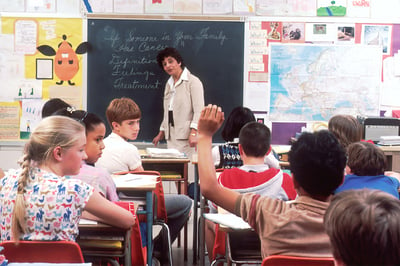Many of us remember trips to the nurse's office in our brick-and-mortar schools. But did you know that cyber schools, including cyber charters, have health services as well? In this blog, Regional Nurse Ms. Olcese-Mercurio explores the role of these healthcare professionals, and how they help your child and family!
Many school nurses have embraced the saying "Children must be healthy to be educated, and educated to be healthy."
This concept encapsulates the mission of health services in schools across Pennsylvania — including cyber schools! The goal of student health services in school is to support students physically, emotionally, and psychologically, so students can fully absorb and embrace their education. In this post, I’m going to discuss what Pupil Health looks like in some cyber schools, and how it can benefit your family!
What is School Health?
A school health department may go by different names. Some schools call it health services, others the nursing department, while some, like PA Virtual, have a Pupil Health department. All public schools in Pennsylvania, whether they are brick and mortar or cyber, have some sort of student health department to ensure that schools are in compliance with Pennsylvania state laws. The student health department may be composed of CSNs, or certified school nurses, support nurses, and health room assistants, all of whom perform many tasks related to student health.
School nurses work to support the health of the whole child. From a physical health standpoint, that means making sure students have up to date immunizations, health screenings, physical exams, and dental exams. In the state of Pennsylvania, students need different things depending on their grade level:
- Every student needs a basic health screening, including height, weight, and vision every year;
- Students in grades K, 1, 2, 3, 7, and 11 need hearing screenings;
- Students in grade K, 3, and 7 need dental exams;
- Students in grades K, 6, and 11, need a formal physical, which is typically done by a student’s primary care provider (MD, DO, CRNP, PA);
- Students in grades 6 and 7 need a scoliosis screening.
I know this is a lot of information, but if you’re ever unsure about what your student needs you can always contact your school’s student health department to ask!

What Does Pupil Health Do?
Here at PA Virtual, the goal of the Pupil Health Department is to make sure every student has what they need to be healthy, so that they can learn to the best of their ability. Pupil Health has three full-time regional school nurses, a part-time immunization nurse, a Manager, and a Pupil Health Coordinator! Part of our job is to make sure students are getting the state-mandated immunizations, screenings, and exams, but we do much more than that. Our school nurses:
- work with guidance and teachers on 504 plans;
- Write Individualized Healthcare Plans, which are included in IEPs;
- Advocate for students with disabilities and special needs;
- Participate in school committees related to student health, safety, and achievement;
- Serve as mentors for student projects, for other nurses, and as advisors for clubs;
- Work with FSCs and guidance counselors as needed to support students experiencing both acute and chronic health conditions;
- Collaborate with doctor’s offices to get appropriate action plans and medication orders for students;
- Give educational presentations to students on topics such as oral hygiene and hand washing;
- Perform health screenings;
- Connect families with community resources to better and maintain their health.
Why It's Important
Pupil health departments have been an important part of education for more than a century, serving as a front line of defense to keep students at their best. Just like with teachers, the priority of school nurses and pupil health staff is to care for their students. Keeping students healthy and in the classroom has been the goal of school nursing in the United States since its inception in New York City back in 1902. In fact, absenteeism dropped an amazing 90% within the first six months of having nurses in NYC schools- talk about making an impact!
 Early school nurses advocated for wellness and illness-prevention programs, implemented dental and hearing screenings in schools, and encouraged lessons in hygiene, which are still things we do today. Health screenings allow the school nurse to catch potential problems, such as scoliosis or hearing deficiencies, that may otherwise go unchecked. In addition, research shows that students with dental pain are three times more likely to miss school for dental issues, and actually have poorer school performance.
Early school nurses advocated for wellness and illness-prevention programs, implemented dental and hearing screenings in schools, and encouraged lessons in hygiene, which are still things we do today. Health screenings allow the school nurse to catch potential problems, such as scoliosis or hearing deficiencies, that may otherwise go unchecked. In addition, research shows that students with dental pain are three times more likely to miss school for dental issues, and actually have poorer school performance.
We refer students to the appropriate specialist as needed based on the results of their screenings so that students can get the treatment they need, and follow up with families to ensure the student received the necessary care.
In addition to performing and following up on health screenings, school nurses track and respond appropriately to disease outbreaks. In 2020, we saw the integral role school nurses played in helping curb the spread of COVID-19 in their school communities. Here at PA Virtual, we track cases of COVID-19, and reach out to families to offer support and connect them with resources as needed. We also took steps necessary to ensure student and staff health and safety during face-to-face events, such as standardized testing.
Reflections from a Cyber School Health Professional
One of the main reasons I became a school nurse was so I could work with students and help them reach their greatest potential by maintaining good health. Being a nurse at a cyber school allows me to work with students who prefer to learn at home. Some of the benefits of being a cyber school nurse are the same as the benefits for students, in that I get to work from the safety and security of my own home, and I avoid potential issues, such as commuting, school violence, and more.
That said, cyber school nursing is not without its challenges. I miss the opportunity to physically see my students and their caregivers on a daily basis, which can make it more challenging to obtain essential paperwork like asthma action plans or physical forms, as opposed to the in-person reminders available in the brick and mortar setting. However, student health departments in cyber schools utilize email, phones, texting, faxes, and postal mail to their maximum potential so that we can serve our students well!
One of my favorite parts of being a school nurse at PA Virtual is traveling across the region to perform in person health screenings. Every fall and spring, the regional schoolnurses travel throughout the state to hotels, libraries, and other convenient locations to perform height, weight, vision, hearing, and scoliosis screenings. This gives us a chance to help monitor the health of our students, maintain compliance with Pennsylvania state law, and meet our students face to face! I also love utilizing technology to interact with my students and give presentations to help students learn how to maintain their own health. However, the biggest benefit of being a cyber school health professional is seeing my students overcome hurdles, such as barriers to care or complex medical issues, and be successful in school!
Some final thoughts
Pupil health departments play a vital role in the lives of cyber school students, and provide them with services that help prepare them for a successful school experience. Dedicated health professionals have been working to improve the lives of their students since the inception of school nursing, and work hard to support students’ mental, physical, and emotional health. I love being a school nurse at PA Virtual, and hope you have a positive experience with the student health services department in whichever school your students attend!
NOTE: This blog was originally published in May 2022, and has been updated for accuracy of content.
Photo credits to: Robert Collins; National Cancer Institute; and Clipart Library.




Comments